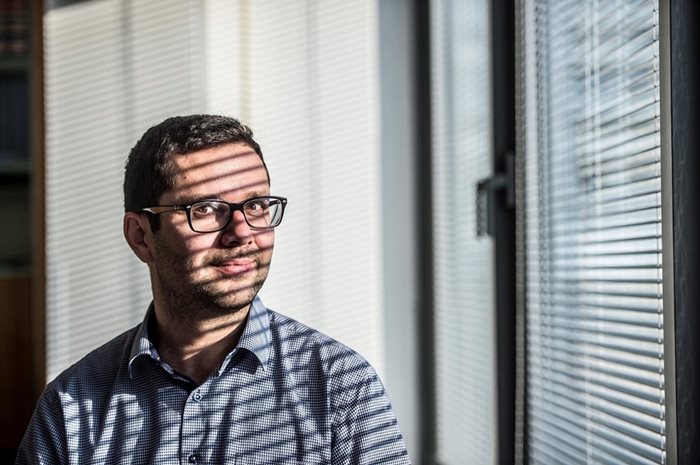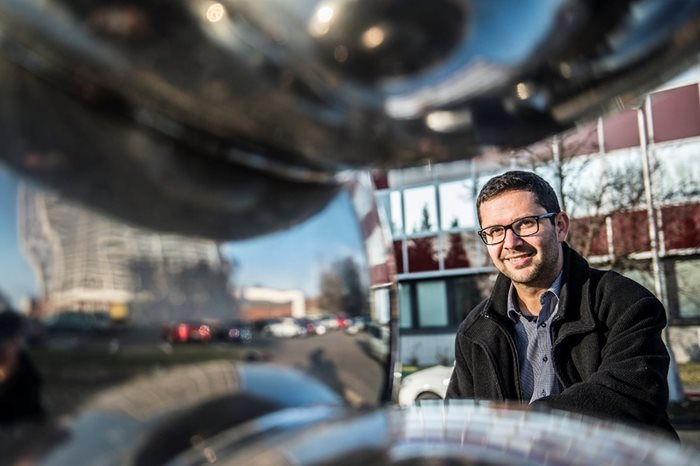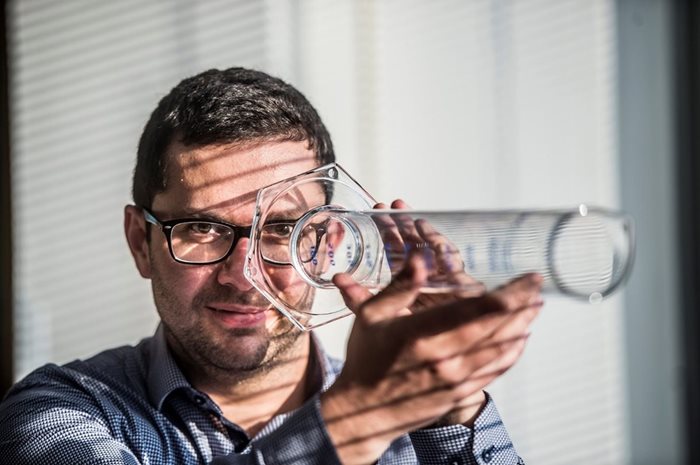‘My biggest task for the next four years is to build a complete campus for our faculty and the Faculty of Medicine in Hradec Králové, and above all, to search for other sources to finance the campus. We also have to deal with the stagnant numbers of people interested in pharmacy studies,’ says Jaroslav Roh in an open interview. The current vice-dean for scientific activities, doctoral degree programmes and technology transfer at CU’s Faculty of Pharmacy (FoP CU) will become the head of this faculty, located in Hradec Králové, in February.
Assoc. Prof. PharmDr. Jaroslav Roh, Ph. D.
The current vice-dean for scientific activities, doctoral degree programmes and technology transfer at the FoP CU, head of the Department of Organic and Bioorganic Chemistry and leader of the Bioorganic and Medicinal Chemistry Research Group. He graduated from the FoP CU, where he defended his habilitation thesis in 2018 and became an Associate Professor. In 2013, he completed a three-month research placement at the University of Bath (UK), and five years before that he also undertook a three-month internship at the State Institute of Technology in St Petersburg. In 2018, he received the Alfred Bader Prize for Bioorganic and Bioinorganic Chemistry, as well as the Faculty of Pharmacy Medal and the FoP CU Dean’s Award. In October, the Academic Senate elected him to be a candidate for the position of dean for the next four years. He will become the head of the FoP CU in February 2022.

What led you to move up from the role of vice-dean to this one?
It was, above all, my knowledge of the faculty and its management, especially the project delivering our university’s campus, a joint working unit of the FoP and the FM HK, which I am going to be implementing throughout my entire term in office as dean. The project has been planned for a long time. Mephared 1 – the current teaching and research centre situated next to the grounds of the Hradec Králové University Hospital, which houses two of our departments and two FM HK institutes – is now finished. This should be followed by Mephared 2, and when this is finished, we will fully relocate everything and everyone to the campus.
I was worried that if someone else, as in an entirely new team of people, took over the faculty’s management, there could be a certain amount of delay in the development of the faculty and, of course, in the construction of the campus caused by their inherent lack of knowledge concerning this whole complex issue. Logically, they would have to learn a lot of information to be able to gain enough insight into and understand the ‘roots’ of the decisions we have made in recent years.
Due to the current price hikes in the construction industry, it will be difficult to complete the construction work.
Exactly. Right from the start of the project’s preparation phase, it was clear that the faculty would have to share the cost of its implementation, paying a considerable amount of money. There is a real threat now that even though we may be able to finish the building within the current budget, we will have to find extra resources to pay for the furnishings and other costs associated with putting the campus into operation. This will be my main task for the next four years.
Is there anything you are especially looking forward to, something you expect to go smoothly?
I am not sure about going smoothly, as everything needs to be constantly worked on, but I would like to continue with the established development of the faculty as a prestigious research and teaching organisation. In an international evaluation of scientific activities at CU (described in more detail here), we were awarded B+, placing in the top five of the highest quality faculties of Charles University.
We have managed to acquire large research projects and grants, we have one of the best-rated doctoral degree programmes, and the demand for our Master’s degree graduates far exceeds the supply. In the field of personnel development, we adopted Career Rules in 2019, which established clear criteria for the career growth of the faculty’s staff and became a model used for defining the university’s Career Rules that are currently under discussion.
What is the specific procedure involved in evaluating the academic staff in your faculty?
As part of the system of employment contract renewals, in which a maximum of three 3-year fixed-term contracts may be concluded, employees undergo an interview every three years, summarizing the teaching and scientific results they have achieved thus far, their contribution towards the fulfilment of the university’s third role, and their work in practice if relevant. Of these quantifiable criteria, they should always achieve roughly one-third of what is required to commence a habilitation procedure during these three years. After nine years, at which point they should receive a permanent contract, they should be successfully heading towards associate professorship, confirming that they are suited to have a successful career in academia for the rest of their lives, and enter into an employment relationship for an indefinite period of time. If we want to build a truly excellent teaching and research institution, we need to have perfect people working here.

In your programme theses, I read something I found quite surprising. You are facing a shortage of applicants. Why is that?
Some of them may have been ‘pulled over’ by the Faculty of Pharmacy at Masaryk University, which increased the number of student admissions, as well as the Faculty of Medicine, which increased the number of admitted students by fifteen per cent last year. We are aware of the fact that we are often the second choice for those who primarily intend to study at medical school. If they are not admitted here, then their other option is the Faculty of Science at CU or the University of Chemistry and Technology – based on our research, we know that we are most likely to prevail in an imaginary battle over them. Another reason is common to all universities – the unfavourable demographic curve associated with the low number of people born in the relevant years. It is not just about the actual number of applicants, but about those who are able and willing to study.
You have weakened the mean value of marks achieved by students in secondary schools, qualifying them for admission to your faculty without entrance exams. Do you think this may lower your bar?
I do not think so. Granted, we have weakened the required mean score of marks from 1.25 to 1.5, while in chemistry and biology, students’ knowledge must not be marked below 2. It still holds though, that thanks to this, the better-achieving secondary school graduates interested in pharmacy or laboratory diagnostics studies can come study at our faculty.

The increased number of students admitted by the ‘competition’ is one reason. What are the other reasons?
The overall declining prestige of pharmacists in society. To put it bluntly, not all pharmacies are a good advert for the pharmacy sector and pharmaceutical training.
Pharmacists are walking on a thin line between a profession that helps people and a market whose main objective is to make money. How do you and your students deal with this moral conflict?
First, I must mention one important thing. A pharmacist is only one of the professions a pharmacy graduate can do. An increasing percentage of graduates are now opting for clinical pharmacist positions in hospital wards, where they check and determine, together with doctors, pharmacotherapy, i.e. the use of the drugs each patient is supposed to be given. Other graduates find employment in the pharmaceutical industry, as well as in research and other spheres.
Now, what about the ethical issues we have touched upon – is it possible to observe them every time and in every case?
In a relationship with patients, it should always be the level of expertise that is the deciding factor. Just as doctors, pharmacists and clinical pharmacists should chiefly concentrate on the well-being and interests of their patients, and do what they can do best – be a doctor’s professional partner, assist with the selection of pharmacotherapy and provide the patient with the relevant information on drug use in an understandable form. They should be valued according to this, not primarily according to the ‘on the box’ margin.
In cooperation with the Czech Chamber of Pharmacists and professional companies, we also try to ensure that pharmacists have erudite knowledge, that they function as true drug experts when dealing with the public and that pharmacies and pharmacists do not present themselves as primarily business entities. This may be a little related to the last, as yet unmentioned, reason for the stagnating numbers of applicants interested in studying here.
Improving the promotion of the branch?
Exactly. We are pursuing several activities in this area. We are making ourselves known to secondary school students, we provide information about our results and achievements, and are making an effort to present ourselves as a professional institution whose graduates can find employment in a truly wide range of sectors. However, I am probably not alone in thinking that the presentation of our faculty must be improved. We have to create a comprehensive concept for the promotion of the courses provided by our faculty and improve the links between the individual activities. Besides the construction of the campus, my second big task is to figure out how we might increase the number of applicants.

Are you considering opening new fields of study that could attract slightly different prospective students than before?
We are thinking about it very intensely. We have even come up with some distinct ideas already, but for the time being, I do not want to be specific, taking our possible competition into consideration. This year, for the first time, we have opened a brand-new follow-up Master’s programme called Pharmaceutical Sciences, which is taught in English. I think that we have cleverly managed to fill the gap in the market and take advantage of the demand mainly from Asian students, although we are not the only school in Europe to offer something like this. In many Asian countries, pharmacy is studied in Bachelor’s degree programmes, so they can, thanks to our programme, complete their education here in a Master’s course and obtain a Master’s degree.
How interested are foreign students in your main five-year Master’s degree programme Pharmacy taught in English?
In the past, we were happy when we managed to fill one group of thirty students. This year, we have two groups and are on the edge of current capacity. In addition to the fact that this is a considerable financial contribution to our budget, it also supports the international character of our faculty. However, we also have foreign applicants who wish to study in the Czech language, namely Ukrainians, Belarusians and Russians. We are happy that this is the case, as they are usually very motivated and good-quality people. Of course, I did not mention Slovaks, as we do not consider them foreigners in this respect. We now have a significant percentage of foreigners in our doctoral programmes as well, and most of our departments have at least one permanent member of staff who has come from abroad. This is certainly one way to improve our teaching and, above all, the quality of research at the faculty. Colleagues from abroad bring new ideas, new topics and experience. On the other hand, all our current staff must be able to communicate and teach in English; everything is interconnected.
Studying at the FoP CU is known for being demanding. At what stage do most students go through a ‘classifying screen’? Does it traditionally happen during the first year?
Yes, it does. Our relatively most demanding subjects are taught in the first year, so that students can find out right from the start whether they have got it in them to complete their studies here. At the same time, we try to be forthcoming by providing a few optional subjects alongside the main compulsory ones. The optional subjects are designed to explain, partially catch up and fill in the missing knowledge from secondary school.
Unfortunately, last academic year saw almost one hundred students out of 280 enrolled in our pharmacy degree programme drop out, whereas in the previous years, the failure rate was minimal. In total, about sixty per cent of admitted students graduate from our school.
Granted, it is ‘only’ the larger half, but on the other hand, all of them are able to find employment in the job market working in their chosen branch.
Exactly. Due to the responsibility that is part of the pharmacist profession, we cannot afford to release low-quality and poorly prepared graduates into practice.
Text: www.ukforum.cz/en
Photo: Vladimír Šigut